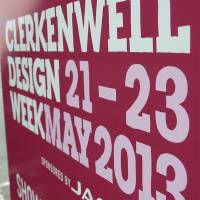 In contrast to last year when the sun shone and temperatures were giddily high, Clerkenwell in late May was distinctly chilly, with a constant stiff breeze, on and off rain, and even a hailstorm. The weather may have been unseasonably cold but that didn’t stop the crowds flocking to the most popular venues and showrooms, and several of the evening parties were so crowded they had to close their doors. The signs had been good, even before the show opened. Advance registrations were over 46,000, compared with last year’s 22,000 visitors and by the end of the show, total registrations had reached 55,000.
In contrast to last year when the sun shone and temperatures were giddily high, Clerkenwell in late May was distinctly chilly, with a constant stiff breeze, on and off rain, and even a hailstorm. The weather may have been unseasonably cold but that didn’t stop the crowds flocking to the most popular venues and showrooms, and several of the evening parties were so crowded they had to close their doors. The signs had been good, even before the show opened. Advance registrations were over 46,000, compared with last year’s 22,000 visitors and by the end of the show, total registrations had reached 55,000.
The show is a hybrid in several ways. The event venues are a combination of 50 permanent showrooms, along with a variety of interesting buildings, popups and outdoor sites which are commandeered to create temporary exhibition areas. The two common themes are the Clerkenwell area of London and design, predominantly in the form of furniture, furnishings and interior accessories.
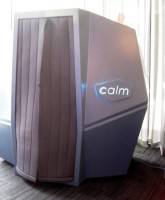
Haworth CalmSpace
London is probably the only city in the world where a show like this can be held. Clerkenwell has one of the world’s highest concentrations of architects and designers and this has attracted more and more office
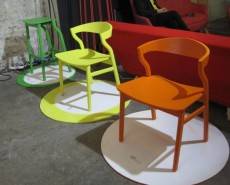
Kalea from Bedont
furniture and interiors’ companies to the area. The beauty of it is that everything is so close together and the area is easily walkable, from one side to the other, in less than fifteen minutes. Many of the buildings are interestingly old and attractive, even if that means they are sometimes tricky to use efficiently. Outdoor areas included the beautiful Garden and Cloister of the Order of St John which displayed Cane-Line products. The prisoners’ cells in the House of Detention, formerly a Victorian gaol, provided nicely spooky spaces to show creations from younger designers.
During the day, most of the permanent showrooms concentrated on the serious business of presenting products, some of it newly launched. By night however, it was party time with hordes of youthful design folk crammed into showrooms and being deafened by sound systems and dazzled by strobe lights. Some events were so popular that capacity limits were quickly reached, after
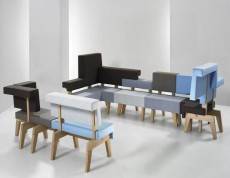
WorkSofa from Prooff
which it was one out, one in, leaving hundreds outside in the cold.
Many really interesting events attracted large and well-informed audiences. These included Humanscale’s Shane Cohen explaining why lower ambient and adjustable task lighting was healthier, greener and improved efficiency, Martin Ballendat telling the story behind the design of Dauphin’s Litte Perillo chair and Tom Lloyd of Pearson Lloyd describing new Riya and Bay chairs for Bene. French designer Marie-Virginie Berbet presented Haworth’s nap pod, CalmSpace, a sleeping capsule for taking power naps at the office.
Hands of Wycombe, the old established UK company that prides itself on the use of high quality materials and traditional skills asked Andrew Muirhead of the Scottish leather company that bears his name to present a workshop on the subject of the use of leather in upholstery. As for
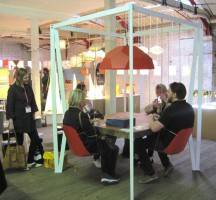
Swing Table from Duffy of London
the new products on display, breakout furniture was trending, with every shape and size of high backed enclosure creating environments for small meetings, collaboration and interactive presentations. Designers had been let off their leashes and had dreamt up every form and colour of soft seating imaginable. What has yet to be seen is any way of managing the transition between the hard shapes, conservative solid colours and rigid structures of workstations and storage products, and the exuberance of breakout areas. It’s as if they’re two separate worlds rather than part of one and the same organisation.
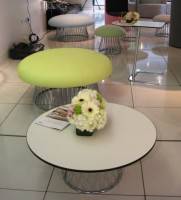
Magic by Boss
The long-established Italian company Bedont from Pianezze near Vicenza showed their new colourful Kalea side chair, designed by Lorenz+Kaz. There was a wealth of attractive product on four floors of the Farmiloe Building, an old unreconstructed warehouse, which housed a large number of international brands, many of them new to London. Prooff from the Netherlands showed several pieces from their breakout furniture ranges including their WorkSofa designed by Studio Makkink & Bey. Muuto (Finnish for “new perspective”) from Denmark, concentrate on offering furniture from several Nordic countries.
Fifty of the established permanent showrooms in the area participated in Clerkenwell Design Week, including companies from the UK, Italy, the USA, Germany, Australia, Spain, Japan, Austria, Belgium, Denmark, Sweden, Turkey, the Netherlands and Switzerland. Bene’s showroom featured two new chairs, the Riya and the Bay, both designed by Pearson Lloyd.
Thinking Ergonomix from New South Wales, Australia were participating in their second CDW, and their colourful showroom next to
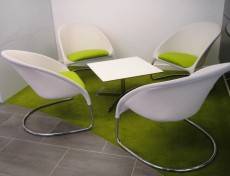
Kinnarps Sitter L
Vitra attracted plenty of visitors. The large and well-located Vitra showroom doubles as the company’s UK headquarters where they were attracting attention with their feature – the “citizen office” project, as well as with several new products displayed in hubs created using Workbays – and an interview with designer Erwan Bouroullec.
Boss Design, the UK seating and table specialists, showed the new Magic stools and tables from David Fox, and a new range of enclosures. The Dutch acoustic specialists, Buzzispace, who will be opening their new 10th floor permanent showroom at the Merchandise Mart in time for Neocon next month, continued to extend the applications for their products with a new range of floorcovering products made from offcuts and waste materials. Ahrend, also from the Netherlands, featured the Living Wall and a held a competitive art show.
The Swedish giant Kinnarps, which now incorporates a number of the former Samas Group companies especially from Germany, makes up the largest office furniture group in Europe. Their new four storey showroom in the area, created with assistance from Jeremy Myerson’s Helen Hamlyn Institute, featured many new products. Their unusual Sitter L chair from designer Henrik Schulz with a double mesh back was thought by many to be one of the most comfortable chairs in the show.
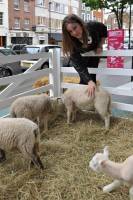
Sedus’s ovine whimsy
There was more collaboration-friendly furniture from the British company, Connection. Their new integrated Liquid Workspaces system creates meeting, collaboration and learning environments. The extended Hive products from Roger Webb included presentation areas.
Clerkenwell Design Week was supported by a number of sponsors including Jaguar who used the opportunity of
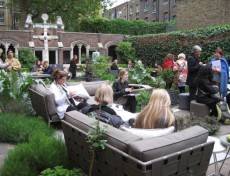
Garden & Cloister of the Order of St John
showing several examples of the new F type which, unsurprisingly, attracted considerable attention. It was sad that so many companies failed to obtain full benefit from the often very substantial investment they had made in their showrooms, and their participation in the show. Visitors observed that they had lost track of the number of showrooms they went into, walked around, and left without being approached, asked who they were, what their interest was, or for a business card.
Whimsy was on offer, with lambs and their shepherd in a pen outside the Sedus showroom and
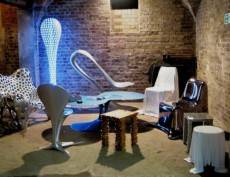
Former prison cell in the House of Detention
the British company Elite, who turned their showroom into the Willy Wonka Chocolate Factory to the delight of a couple of thousand of their visitors.
In summary, Clerkenwell Design Week 2013 was successful for the visitors, exhibitors, organisers and sponsors alike. In four years, it has grown from being a forum for young designers to become a fully fledged, professional design-led event, on an international scale. To have achieved that in the really tricky market conditions of the past few years is no mean feat. The success has been helped by Clerkenwell itself, with its exciting mélange of history, architecture and quirkiness which has attracted architects, designers and office furniture and furnishings businesses into one small area of a major world city. We hope that the event continues to thrive and prosper.
________________________________________
 John Sacks is a chartered accountant, with an honours degree in Law from the University of London, and over 40 years experience managing office furniture manufacturing companies in Europe. Now Managing Partner in JSA Consultancy Services, a business consultancy based in London which helps international office and contract furniture companies with their corporate strategy, marketing and product design and development.
John Sacks is a chartered accountant, with an honours degree in Law from the University of London, and over 40 years experience managing office furniture manufacturing companies in Europe. Now Managing Partner in JSA Consultancy Services, a business consultancy based in London which helps international office and contract furniture companies with their corporate strategy, marketing and product design and development.
www.jsacs.com













May 29, 2013
Crowds brave the grey weather to enjoy Clerkenwell Design Week
by John Sacks • Comment, Flooring, Furniture, Products, Workplace design
The show is a hybrid in several ways. The event venues are a combination of 50 permanent showrooms, along with a variety of interesting buildings, popups and outdoor sites which are commandeered to create temporary exhibition areas. The two common themes are the Clerkenwell area of London and design, predominantly in the form of furniture, furnishings and interior accessories.
Haworth CalmSpace
London is probably the only city in the world where a show like this can be held. Clerkenwell has one of the world’s highest concentrations of architects and designers and this has attracted more and more office
Kalea from Bedont
furniture and interiors’ companies to the area. The beauty of it is that everything is so close together and the area is easily walkable, from one side to the other, in less than fifteen minutes. Many of the buildings are interestingly old and attractive, even if that means they are sometimes tricky to use efficiently. Outdoor areas included the beautiful Garden and Cloister of the Order of St John which displayed Cane-Line products. The prisoners’ cells in the House of Detention, formerly a Victorian gaol, provided nicely spooky spaces to show creations from younger designers.
During the day, most of the permanent showrooms concentrated on the serious business of presenting products, some of it newly launched. By night however, it was party time with hordes of youthful design folk crammed into showrooms and being deafened by sound systems and dazzled by strobe lights. Some events were so popular that capacity limits were quickly reached, after
WorkSofa from Prooff
which it was one out, one in, leaving hundreds outside in the cold.
Many really interesting events attracted large and well-informed audiences. These included Humanscale’s Shane Cohen explaining why lower ambient and adjustable task lighting was healthier, greener and improved efficiency, Martin Ballendat telling the story behind the design of Dauphin’s Litte Perillo chair and Tom Lloyd of Pearson Lloyd describing new Riya and Bay chairs for Bene. French designer Marie-Virginie Berbet presented Haworth’s nap pod, CalmSpace, a sleeping capsule for taking power naps at the office.
Hands of Wycombe, the old established UK company that prides itself on the use of high quality materials and traditional skills asked Andrew Muirhead of the Scottish leather company that bears his name to present a workshop on the subject of the use of leather in upholstery. As for
Swing Table from Duffy of London
the new products on display, breakout furniture was trending, with every shape and size of high backed enclosure creating environments for small meetings, collaboration and interactive presentations. Designers had been let off their leashes and had dreamt up every form and colour of soft seating imaginable. What has yet to be seen is any way of managing the transition between the hard shapes, conservative solid colours and rigid structures of workstations and storage products, and the exuberance of breakout areas. It’s as if they’re two separate worlds rather than part of one and the same organisation.
Magic by Boss
The long-established Italian company Bedont from Pianezze near Vicenza showed their new colourful Kalea side chair, designed by Lorenz+Kaz. There was a wealth of attractive product on four floors of the Farmiloe Building, an old unreconstructed warehouse, which housed a large number of international brands, many of them new to London. Prooff from the Netherlands showed several pieces from their breakout furniture ranges including their WorkSofa designed by Studio Makkink & Bey. Muuto (Finnish for “new perspective”) from Denmark, concentrate on offering furniture from several Nordic countries.
Fifty of the established permanent showrooms in the area participated in Clerkenwell Design Week, including companies from the UK, Italy, the USA, Germany, Australia, Spain, Japan, Austria, Belgium, Denmark, Sweden, Turkey, the Netherlands and Switzerland. Bene’s showroom featured two new chairs, the Riya and the Bay, both designed by Pearson Lloyd.
Thinking Ergonomix from New South Wales, Australia were participating in their second CDW, and their colourful showroom next to
Kinnarps Sitter L
Vitra attracted plenty of visitors. The large and well-located Vitra showroom doubles as the company’s UK headquarters where they were attracting attention with their feature – the “citizen office” project, as well as with several new products displayed in hubs created using Workbays – and an interview with designer Erwan Bouroullec.
Boss Design, the UK seating and table specialists, showed the new Magic stools and tables from David Fox, and a new range of enclosures. The Dutch acoustic specialists, Buzzispace, who will be opening their new 10th floor permanent showroom at the Merchandise Mart in time for Neocon next month, continued to extend the applications for their products with a new range of floorcovering products made from offcuts and waste materials. Ahrend, also from the Netherlands, featured the Living Wall and a held a competitive art show.
The Swedish giant Kinnarps, which now incorporates a number of the former Samas Group companies especially from Germany, makes up the largest office furniture group in Europe. Their new four storey showroom in the area, created with assistance from Jeremy Myerson’s Helen Hamlyn Institute, featured many new products. Their unusual Sitter L chair from designer Henrik Schulz with a double mesh back was thought by many to be one of the most comfortable chairs in the show.
Sedus’s ovine whimsy
There was more collaboration-friendly furniture from the British company, Connection. Their new integrated Liquid Workspaces system creates meeting, collaboration and learning environments. The extended Hive products from Roger Webb included presentation areas.
Clerkenwell Design Week was supported by a number of sponsors including Jaguar who used the opportunity of
Garden & Cloister of the Order of St John
showing several examples of the new F type which, unsurprisingly, attracted considerable attention. It was sad that so many companies failed to obtain full benefit from the often very substantial investment they had made in their showrooms, and their participation in the show. Visitors observed that they had lost track of the number of showrooms they went into, walked around, and left without being approached, asked who they were, what their interest was, or for a business card.
Whimsy was on offer, with lambs and their shepherd in a pen outside the Sedus showroom and
Former prison cell in the House of Detention
the British company Elite, who turned their showroom into the Willy Wonka Chocolate Factory to the delight of a couple of thousand of their visitors.
In summary, Clerkenwell Design Week 2013 was successful for the visitors, exhibitors, organisers and sponsors alike. In four years, it has grown from being a forum for young designers to become a fully fledged, professional design-led event, on an international scale. To have achieved that in the really tricky market conditions of the past few years is no mean feat. The success has been helped by Clerkenwell itself, with its exciting mélange of history, architecture and quirkiness which has attracted architects, designers and office furniture and furnishings businesses into one small area of a major world city. We hope that the event continues to thrive and prosper.
________________________________________
www.jsacs.com